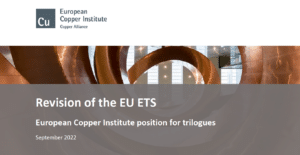The European Copper Institute (ECI) supports the EU’s climate ambitions for 2030 and 2050. Ambitious policies are needed to increase electrification, the deployment of renewables and energy efficiency to decarbonise the European economy and reduce dependency on Russian fossil fuels.
Copper is a crucial raw material for electrification and for the energy transition at large: it is the one non-ferrous metal used in all the main decarbonisation technologies today. More copper will therefore be needed in the coming years to enable the decarbonisation of the economy.
As an energy intensive industry, the copper producers that we represent in Europe are taking steps to decarbonise their production sites and are committed to working towards carbon neutrality by 2050. Copper producers today face the twin investment challenge of increasing production to meet the needs of the energy transition, while also investing to lower the environmental and carbon footprint of copper production.
In Europe, unprecedented energy prices are increasing the operational costs of copper smelters and refiners, and causing a competitive disadvantage vis-à-vis producers in other regions where energy prices remain lower. Access to affordable renewable and low-carbon electricity is a pre-requisite for decarbonising copper production.
In the current situation, this is a key concern for the industry. In this context, we call on the EU institutions to support a revision of the EU ETS in the trilogue negotiations which does not go beyond the level of ambition proposed by the Commission. Reducing GHG emissions by 61% by 2030 as proposed by the Commission is already a huge challenge for energy intensive sectors. The increase of the Linear Reduction Factor (LRF) to 4.2% and a one-off deletion of 119 million EUAs in 2024, reflected in the increase of the maximum benchmark improvement rate to 2.5%, would drastically cut free allocation to the copper sector by 50% compared to Phase III.
Revising the ETS in this way could lead to direct carbon costs of € 130 M eating up 22% of the free cash flow of copper smelters and refiners in the EU in 20301. During the same time period, the investments required for the decarbonisation of copper smelting and refining in the EU have been estimated at around € 600 M. It is important to note that significant additional capital expenditure will equally be needed to expand production capacity in order to meet growing copper demand.
Copper producers in Europe need the support of governments and EU policymakers to be able to make the investments required. If carbon leakage protection measures (direct and indirect) are phased down too quickly, European producers will face much higher carbon costs than non-EU producers. Because copper is traded on global commodity markets such as the London Metals Exchange, copper producers cannot pass on these costs to consumers without losing market share to global competitors.
Combined with the prospect of prevailing high energy prices in Europe, a faster reduction of carbon leakage protection would put at risk the future of copper production in the EU at a time when demand for copper to enable the faster deployment of solar and wind farms, heat pumps, batteries, electricity grids and other decarbonisation technologies is growing.

